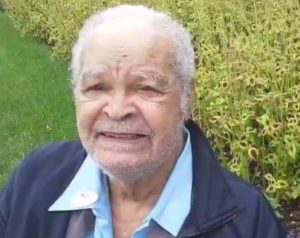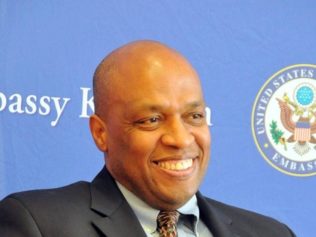
George Nauflett (Screen shot via WUSA9)
A notable Black inventor and chemist died in a house fire at his home in Oxon Hill, Maryland Oct. 28.
WUSA9 reported that George Nauflett died at age 84 as he and his wife Minnie Nauflett tried to escape the flames. Minnie managed to make it out of the home they shared for 50 years. She underwent treatment at a local hospital.
However, her husband perished in the house.
“He said that he was right behind her,” George’s son Derrick Nauflett told the news station. “And he actually was. [He] made it halfway. [And] just where you cut the corner to walk out the door he succumbed.”
Firefighters responded to a call at around 11:30 p.m. Friday. Authorities are still investigating the matter, looking into a cause and reviewing if the smoke alarms in the home worked. The estimated damages total $100,000.
On Oct. 30 in an interview with The Washington Post, Derrick spoke about his father’s more than four-decade Navy laboratory career.
Regarding the joke about not being a rocket scientist, Derrick said his dad took delight in replying, “Actually, I am.” During his time in the Navy lab, George created many inventions and acquired over 24 patents.
“He could have been a millionaire with all the patents that he had and he developed,” George’s 54-year-old daughter Joyce Bradford told the newspaper. “But he was just happy having food, clothing, shelter. If you saw him on the street you wouldn’t think he was as brilliant a man as he was. There was no pretense about him.”
George lived in the south during the 1930s and 1940s with his aunt and dropped out of school in the eighth grade. He joined the Air Force at 19 and utilized educational opportunities offered by the GI bill. George obtained his GED with the help of an officer. Then, he studied chemistry at the historically Black Tougaloo College. George would later enroll in graduate school at Howard University, another HBCU.
“His passion was science,” Derrick said, noting George helped with his children’s science projects. “He was very engaged with all of his kids early on. He was very in tune to helping us find what our passions were.”
But as a Black man, engaging in the industry meant defying misconceptions. George explained as much to Voice of America about the 2004 book, The Inventive Spirit of African Americans: Patented Ingenuity. The text featured George’s work.
“People don’t believe you can do the things you do,” he said. “They say you’re just lucky. But when you keep doing it over and over again, you end up proving yourself.”
In his last few years, George lost some use of his legs. He relied on a walker or an electric scooter for mobility. Because of the loss in movement, George couldn’t tend to his beloved vegetable garden the way he wanted to.
“Now he has his legs back,” Derrick told The Post. “That’s where I get my relief from. That’s where I draw my peace from. He is now whole up in heaven.”

